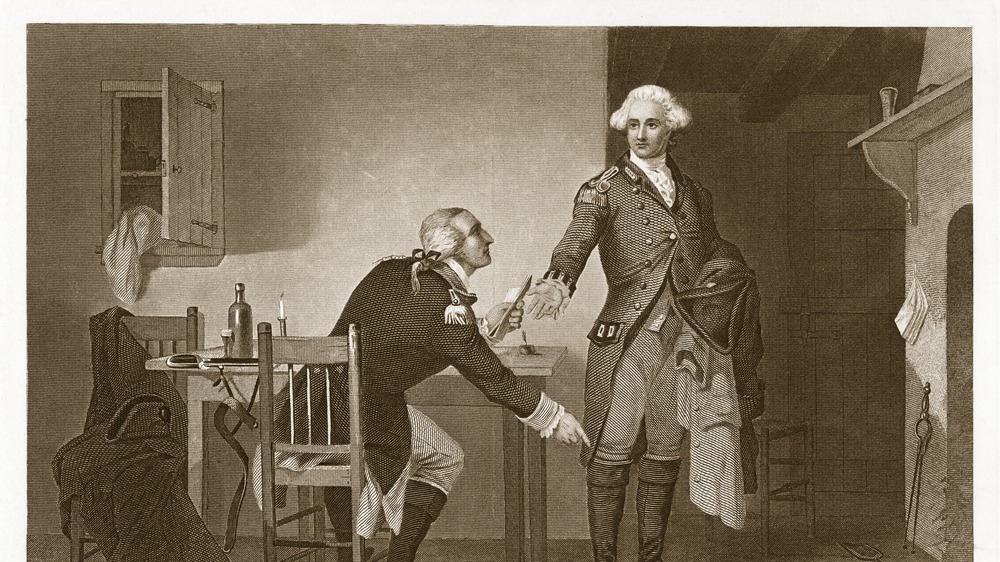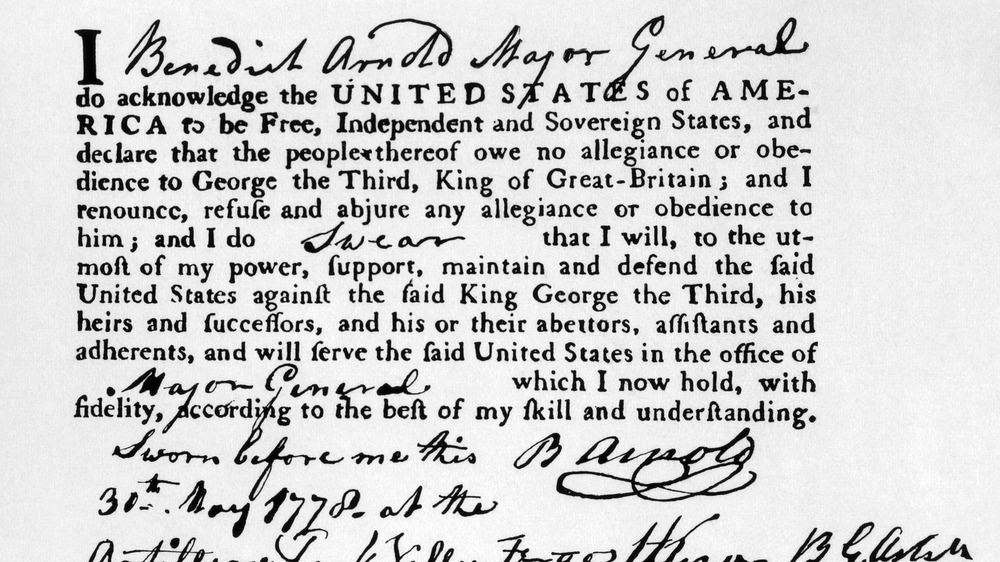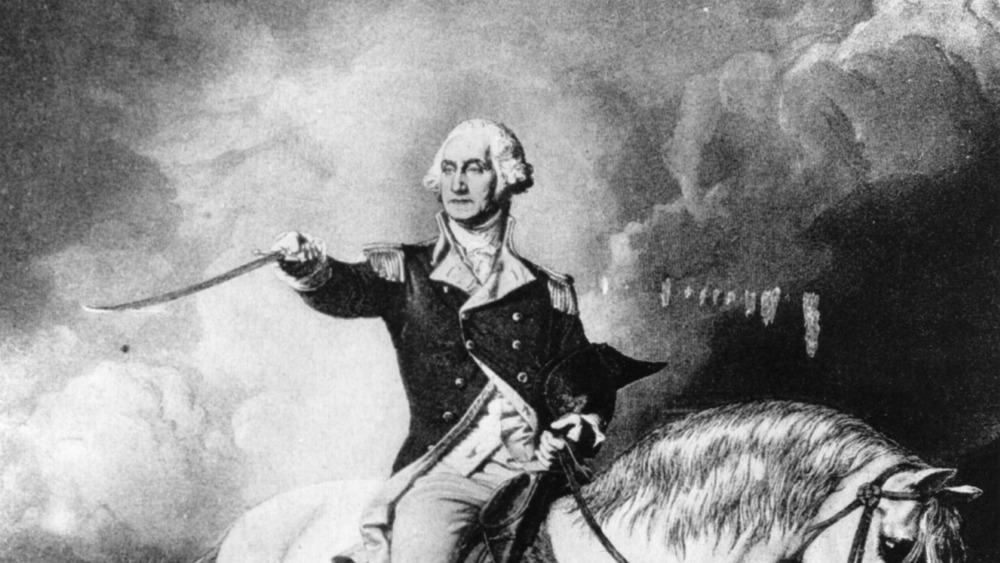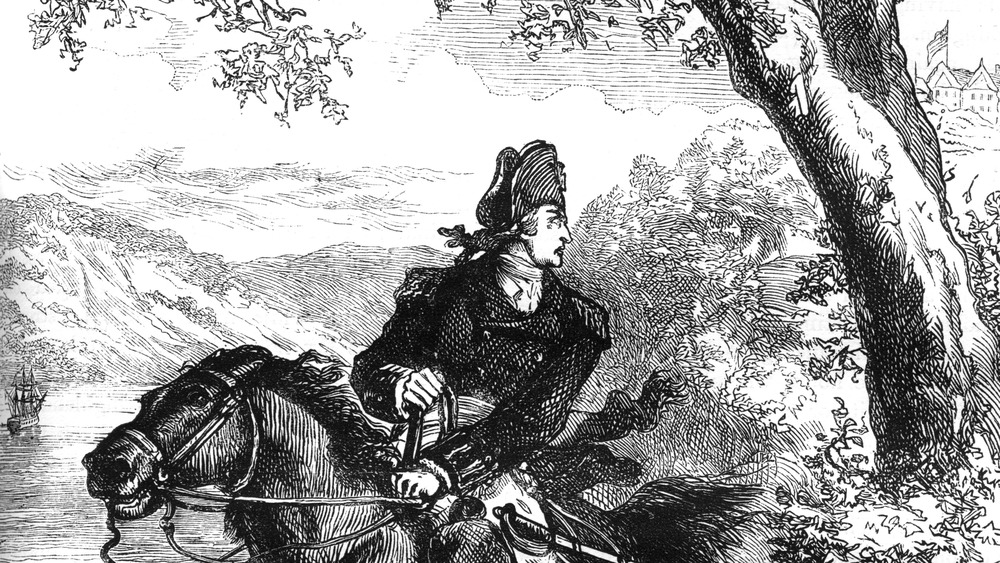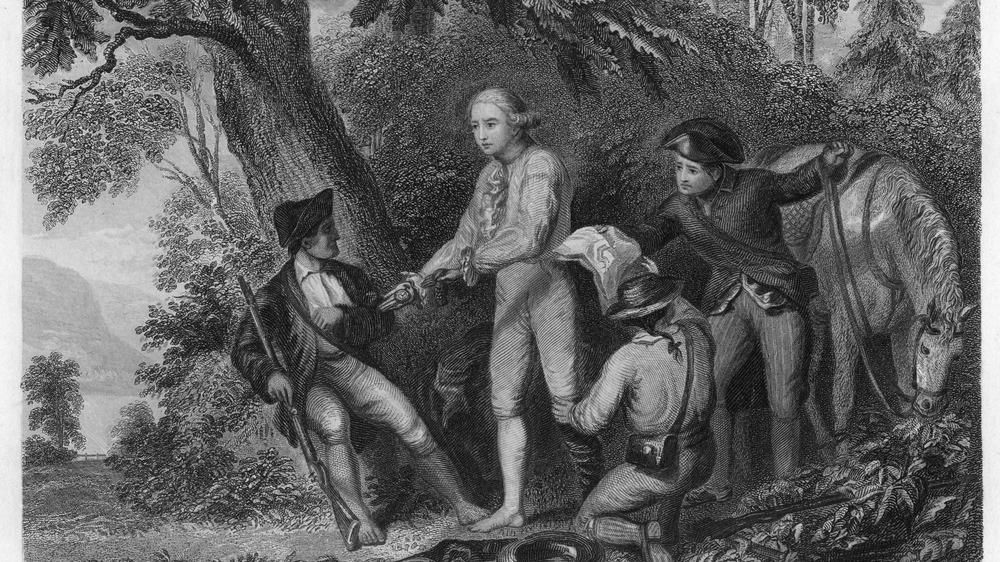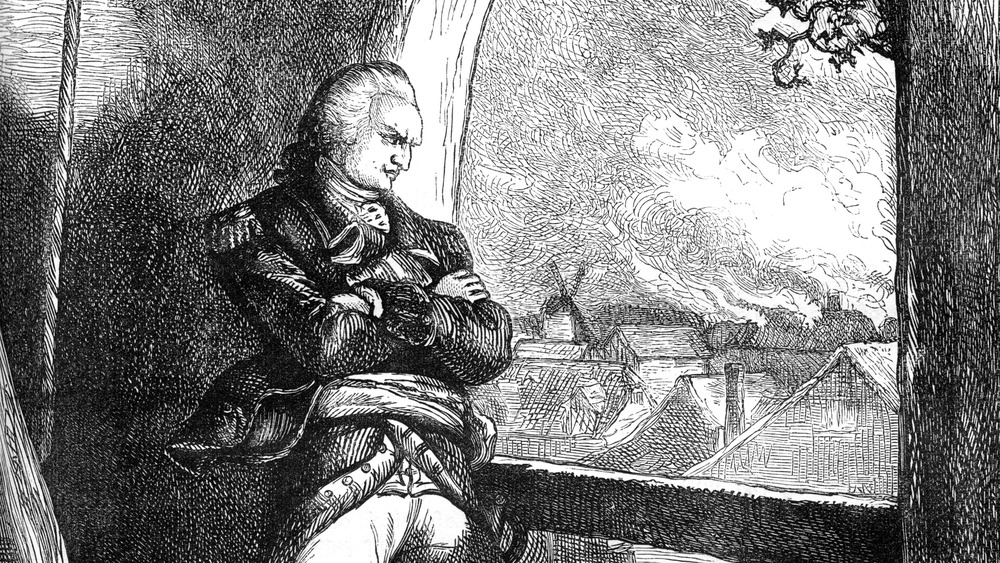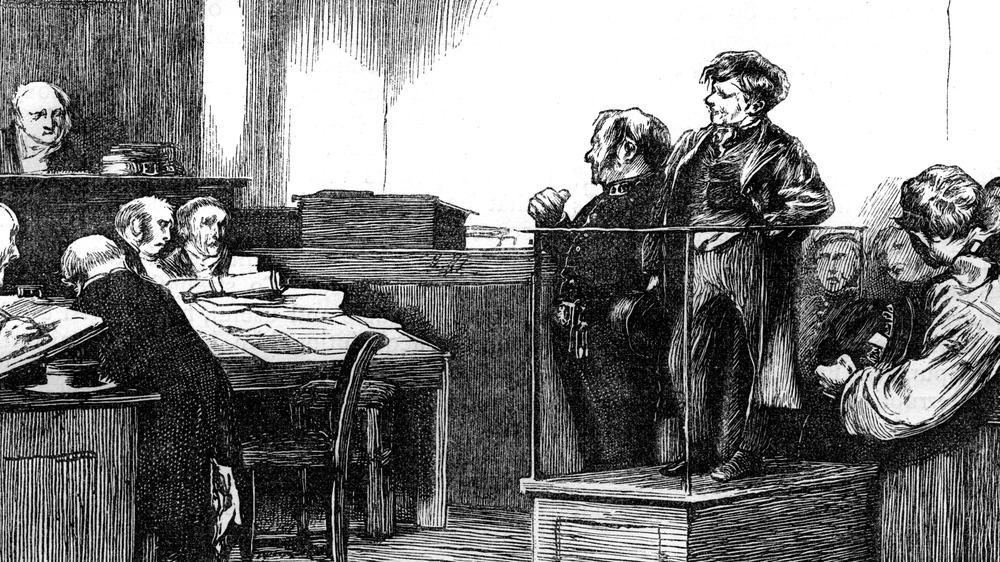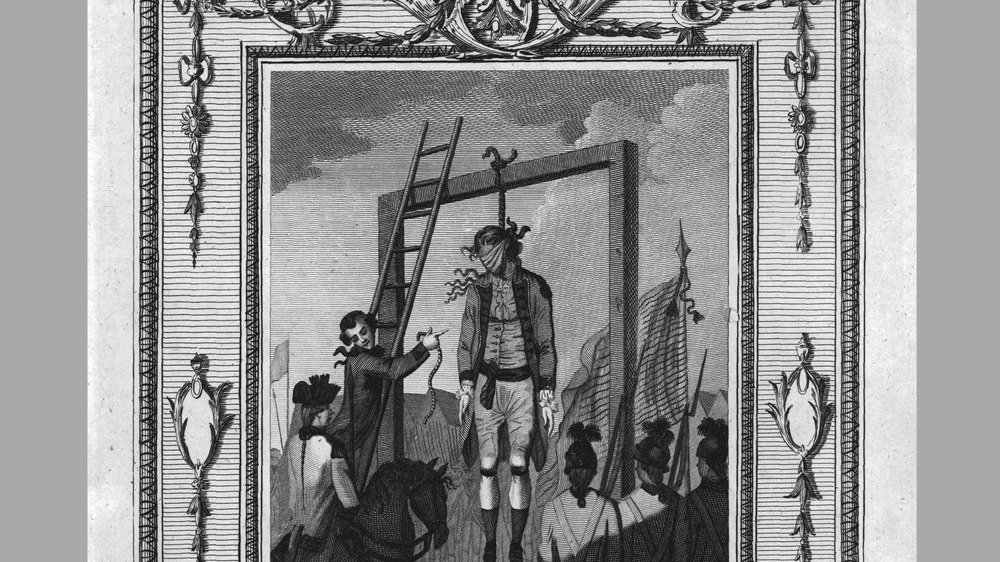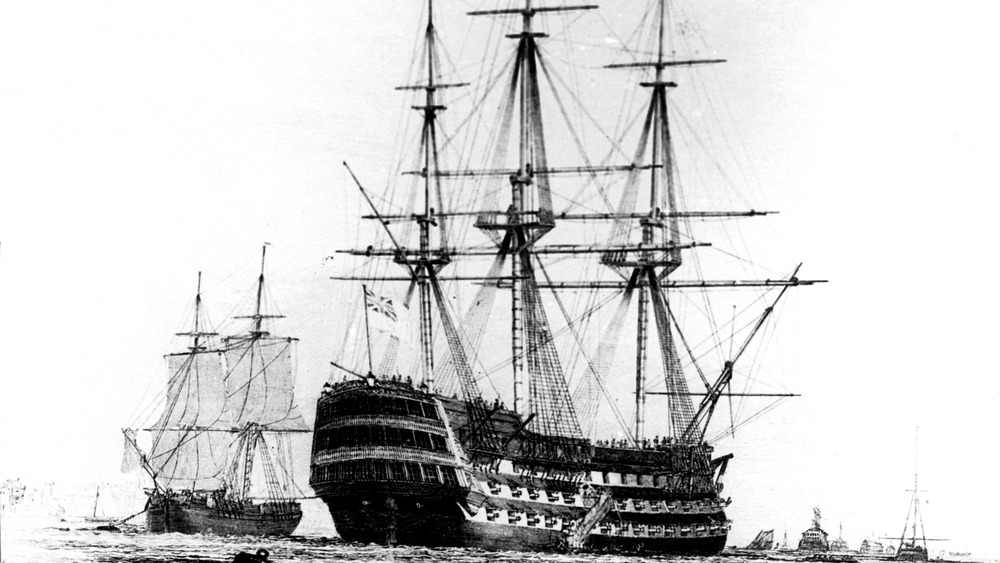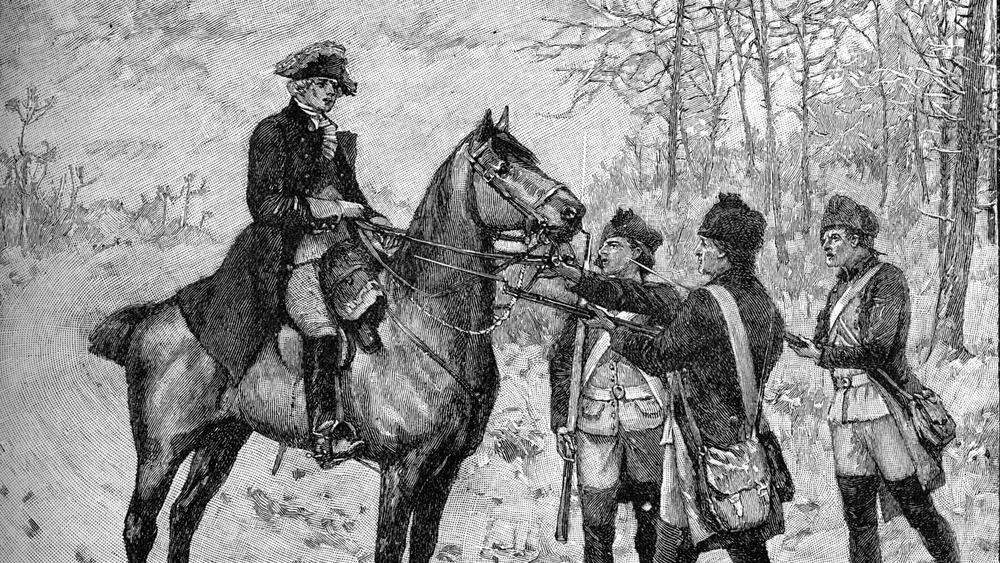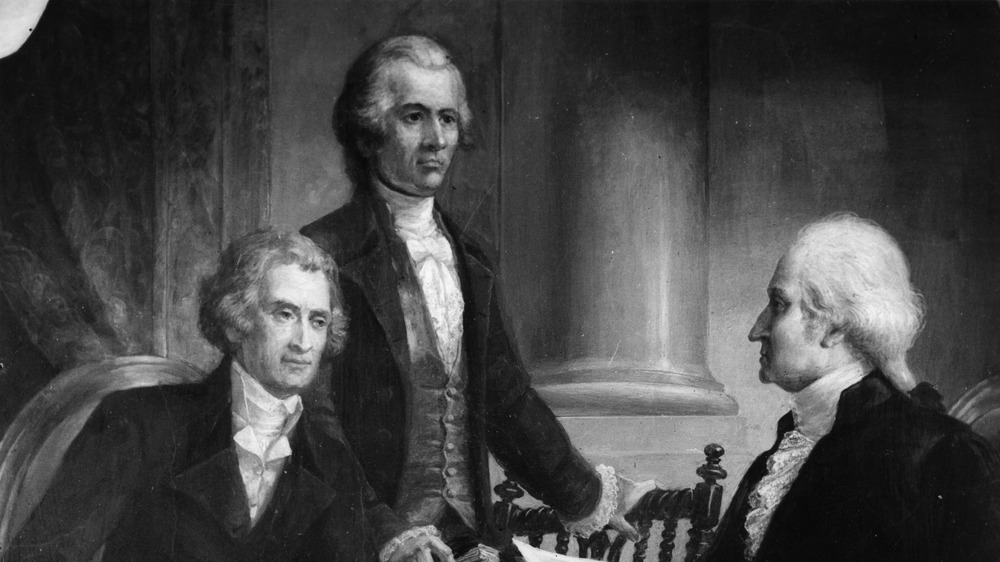False Things You Believe About Benedict Arnold
Few individuals have captured public and patriotic ire in the same way as Benedict Arnold. Once a decorated American military officer, Arnold's name is now synonymous with the very idea of treason. His defection to the British side from the Continental Army has become the stuff of legend — and his name itself has become a scathing political indictment.
But, history is written by the victors. If the American Revolution had been quashed, Arnold might now be known as the truest of patriots — a man before his time. And not only is history written by those who won, but history is also malleable.
During the past year, the words "Benedict Arnold" have been thrown around quite a bit — with comparisons to everyone from Rudy Guiliani to Donald Trump. But few really have an idea of who Arnold was — man, myth, and legend. Arnold betrayed the Continental Army in 1780, and what is known about him comes from 240-year-old letters, political documents, and news reports. Some is hearsay, some is taken out of context, and some is pure supposition.
So, let's take a look at some of the most common misconceptions about America's greatest traitor.
Benedict Arnold committed treason for the cash
They say the love of money is the root of all evil. But while money is a simple and easy motivation, it's very unlikely that a staunch patriot like Benedict Arnold would have sold out his country solely for the money. By 1780, Arnold actually had a lot of reasons to commit treason. In fact, it's likely that he didn't consider it treason at all.
By the time Arnold secured his infamous place in history, he had already been severely injured twice in battle — once seriously enough that he lost the use (and two inches) of his leg. He had been passed up for promotions that he deserved, and he had become disenchanted with the then-chaotic and ineffectual American government. He no longer saw it as a cause worth fighting for.
Following his exile, Arnold would state that he defected to save America, believing that Congress was dragging the country into a prolonged and damaging war. And since Arnold was a competent, well-known general who had been repeatedly ignored and maligned — he had a point.
That's not to say that Arnold didn't stand to benefit financially. He initially requested 20,000 pounds from the British government, as well as 100 pounds per annum for the rest of his life — and 1,000 pounds to his agent (via the New York State Archives). Ultimately, he only received 5,000 pounds (he did fail, after all).
Benedict Arnold was a highly trusted military officer when he turned traitor
When he received the news of Benedict Arnold's betrayal, George Washington famously asked, "Whom can we trust now?" But Washington was a little out of the loop at this point. Arnold certainly wasn't trusted by many.
By the time Arnold betrayed America, he had become the target of a smear campaign — headed by Pennsylvania Supreme Executive Council President Joseph Reed. Arnold had actually been prosecuted on multiple charges of treason by 1780, including buying illegal goods and fraternizing with British loyalists (via History). The latter, of course, was probably true. Arnold had married into a family of British loyalists (though some now suspect they were more neutral than anything else).
All told, Arnold was court-martialed on 13 counts of misbehavior, including misusing government property. And while he was cleared of nearly all charges, he was sternly rebuked for the couple that stuck — Washington himself even issued a reprimand.
Ultimately, the accusations of treason may have worn Arnold down — if he was going to be accused of it, why not do it?
Benedict Arnold was just another military commander
As is usually the case after betraying an entire nation, people talk. In Benedict Arnold's case, many talked about how mean, irritable, and unpredictable he could be. It was easier to cast a traitor as someone unlikely to think ahead, someone difficult to work with, and someone who just wanted to provoke a response. It was much harder to see Arnold as a genuinely talented general.
But talented he was. Arnold claimed multiple, decisive military victories for the Continental Army, and some even argue that he could have been one of the greatest military strategists of the time. While the New Jersey Gazette was calling Arnold "a mean toad-eater," the military was facing the loss of one of its most talented generals.
Though often depicted as rash and foolhardy, very few academics argue that Arnold wasn't an extraordinarily competent military commander. Indeed, some believe that Arnold was the best officer on either side. And that carries with it some implications — implications that weren't comfortable at the time.
At the time of his betrayal, Arnold had carefully contemplated the situation, and he clearly didn't think the American side was going to win. He saw what he perceived as incompetence — perhaps largely driven by their inability to recognize his own strengths — and feared that the American side would continue to be embroiled in a costly and damaging war. But it also goes to show — no one is indispensable.
Benedict Arnold committed his betrayal solely due to money and politics
Benedict Arnold's reasons for betraying America were extraordinarily complex. Some could even argue that, patriotism aside, it might have seemed insane for him not to turn traitor. But despite all the financial and political reasons he had for his betrayal, it's possible it was actually about love.
Before he turned traitor, Arnold wooed and married the very young Peggy Shippen — daughter of a family known to be British loyalists. Much of his life at the time revolved around romancing her and keeping up with her — which he did, amusingly, with a self-plagiarized letter that he had sent to another paramour just six months prior (via Smithsonian Magazine). (This is the old-fashioned version of mass-sending a "You up?" text.)
His marriage to Shippen influenced quite a few of his later decisions. For one, the Shippen family was very wealthy, and Arnold had promised her father that he would be able to take care of her — so his financial situation wasn't just a practical issue but also an issue of love. For another, Shippen's family had strong ties to London — which opened some significant doors for his future betrayal.
Regardless, his marriage to Shippen cast a lot of doubt on him during a time when he was already on the outs. And that growing tension couldn't have been healthy for the newlywed psyche.
The idea to turn traitor was definitely Benedict Arnold's
There have been many who theorized that Peggy Shippen, Benedict Arnold's wife, was the real mastermind behind the betrayal. Shippen was known for being intelligent and beautiful, and Arnold was a vulnerable widower — his first wife had died in 1775. (Interestingly, both were named Margaret.)
Shippen introduced major financial issues to Arnold's life. He had to move in wealthy circles, he had to keep her in the life she had become accustomed to, and he had to prove himself to her father. All while being a relatively modest merchant. Shippen also introduced into his life sympathies with the British, as her families still had ties to London.
Arnold, of course, had many influences in his life that could have led to an inevitable betrayal. But it certainly couldn't have helped that his strong, attractive wife was less than loyal to the American cause. Her help and support was undoubtedly useful to him, and when caught, Arnold's first action was to write a letter to George Washington pleading for mercy for her (via the Library of Congress).
So, was Shippen the mastermind behind Arnold's scheme to defeat the United States in its infancy? It's impossible to say. And it probably didn't occur in a vacuum. But one can imagine a long-suffering Arnold, home after a hard day at work/war, complaining until his wife says, "Well, why don't you do something about it?"
Benedict Arnold acted alone
One doesn't just sell out the American people without some foreign aid. Still, most people don't realize that Benedict Arnold wasn't acting alone. He was actually working very closely with a British spy by the name of John Andre. And Andre's involvement is also why many believe that Arnold's wife, Peggy Shippen, may have been involved.
A young and talented polyglot, Andre had joined the British Army in 1770 and was captured in 1775. Once paroled, he began moving in the same social circles as Shippen. Some suspected that Shippen might have been his lover. He was eventually promoted to major in the North American British Army and, shortly thereafter, became the head of the British Secret Service.
Of course, it might have been better if Andre had not been involved — well, you know, better for Arnold, not for America. Arnold's scheme was discovered because Andre was found with incriminating paperwork hidden on his person. A pretty big slip for the head of the British Secret Service.
Unlike Arnold, Andre didn't get away. He was sentenced to death and hung. Interestingly, he was highly respected by the Continental Army. George Washington even attempted to exchange Andre for Arnold, requesting to spare Andre's life and hang Arnold instead.
Benedict Arnold was eventually brought to justice
Perhaps because of the fate of other traitors in the world, many assume Benedict Arnold was caught, tried, and hanged. In fact, Arnold successfully moved to London and lived there quite comfortably. Confusion might occur because his accomplice, John Andre, was charged and hung. Stinks to be Andre, but that's not to say that Arnold lived like a king thereafter.
Arnold's new British allies regarded him with some suspicion. Arnold was perhaps the greatest traitor in American history. But from their perspective, Arnold had easily escaped from America's wrath and hadn't actually delivered them anything at all. A fairly grand case could be made that he was simply pretending to betray America.
If nothing else, they may have assumed that someone whose allegiances could be easily shifted toward them could be shifted back.
Arnold remained exiled from the United States for the rest of his life, but he reported happiness. He was comfortable but not distinct. He died at the age of 60 and left behind nine children and continuing debt.
Benedict Arnold was just a social climber
Much has been said about Benedict Arnold's tendency to move among the higher classes. With his marriage to young socialite Peggy Shippen, it certainly seemed as though he was trying to outspend his reach. But there was more to the story than that. Arnold actually spent most of his life trying to escape debt.
Arnold came from a wealthy family, but following several bad decisions by his father, as well as the illness of his siblings, they became impoverished. Arnold had to drop out of his expensive school and get to work. Eventually, Arnold became a successful merchant smuggler — but actions by the government (such as increased tariffs and taxation) made even that challenging.
So, by 1780, Arnold was still in debt, trying to live up to a rich and beautiful wife, and being repeatedly passed up for honors and promotions. If you were in that situation, wouldn't you want to sell your boss to the British?
Add on a few court-martials (which made it even more difficult for him to conduct his business), and you start to see why he might have thought that America had betrayed him. Certainly, he likely would have had a low opinion of the idea of the "American dream" (though, of course, he would also have to have waited over a hundred years for that to even become a thing).
Benedict Arnold was impulsive, reckless, and quick to anger
Hundreds of years can dramatically change the way that a person is viewed. Commonly, Benedict Arnold is spoken of as being impulsive, reckless, and quick to anger. But letters from that time indicate that he was actually very thoughtful and level-headed.
A significant amount of media went into casting Arnold as one capable of "treason of the blackest dye." But that was also a virtual necessity. Otherwise, people of the time might very well wonder why one of their heroes would have turned traitor. And the answers would not have comforted them.
After his betrayal, many wrote some unfavorable things about Arnold, but they were often couched with something positive, as well. Lt. John Whiting stated, "I confess I had a good opinion of him as an Officer in the Field, but everthought him to be ambitious and possessed of a great degree of avarice."
While America did win the revolutionary war, in 1780 it wasn't so certain. There were many reasons to think the British would win and there were many opportunities they had to do so. Early in 1780, the American army had suffered their worst defeat in Charleston — and it was later that year that Arnold would meet with British spy John Andre (via History). So, while it's comforting to think of Arnold as being impulsive, he probably carefully considered his treason — and found it the right thing to do from his perspective.
Benedict Arnold's military career ended when he turned traitor
What happens when one of the best military commanders of the time turns traitor? It turns out, very little at all. Many believe that Benedict Arnold's military career just ended — and that's a fair assessment. He didn't do much after donning the British uniform. But he was given the opportunity.
Once with the British Army, Arnold was made a brigadier general. He began to conduct raids on Virginia and remained there until July 1781, when he returned to New York. Accounts of his raids on Virginia are split, with some calling them brutal, and others noting that he mercifully focused on military targets.
But whether it was a personal choice or prejudice, Arnold's career didn't fully recover. Newspapers noted that he was "a very unpopular character in the British army," with some soldiers outright refusing to join his unit. One American plot to kidnap him from his own home nearly succeeded, as Washington wanted to make an example of him. (In a plot twist, the spy that was sent to kidnap Arnold was left adrift and ended up joining the British mission for several months.)
Either way, Arnold didn't spend a lot of time with the British military. He eventually retired and became a merchant again. An interesting choice for someone believed to be one of the best military strategists of the time.
Benedict Arnold asked to be buried in his "Continental Army uniform" on his deathbed
It's commonly stated that Benedict Arnold wished to be buried in his uniform. But this is just a rumor — a legend. Arnold spent his remaining years fighting in a British uniform, and there's no evidence he ever regretted his choice. Of course, this bears slightly more explanation.
Arnold lived and died about two centuries ago. And history comes from recorded documents. Deathbed statements can arise very easily from rumor and legend — and once something becomes a rumor, it's oft-reported.
In Arnold's case, there are two factors contributing to this myth. First, there's the idea that he might have regretted his choice to betray America — that America may have had the last laugh. And second, there's the idea that he may have been truly loyal at the end — that he may have realized and wanted to right his wrongs. Unfortunately, there's just no reason to believe that he did ask to be buried in his Continental Army uniform, because the facts themselves are not recorded anywhere.
Perhaps the only way, at this point, to get down to the truth would be to check for oneself and report back.
Benedict Arnold is considered a traitor by everyone
Benedict Arnold's name is synonymous with being a traitor. Or is it? It's actually a matter up to some debate. Ask someone in the United Kingdom about Arnold, and they'll ask, "Who?"
Some wonder if Arnold's ending as a traitor really overrides his former heroism. It's undeniable that Arnold's military prowess won America's military many strategic victories, without which not only would America have lost more men but may have lost the war. From Arnold's perspective, he had already been betrayed by a new and chaotic government — a government which had left him crippled in one leg and was actively consuming the lives of good young men. Even George Washington was surprised when Arnold was passed up for promotion. Arnold wasn't the only one who believed the Continental Congress foolhardy.
If it's hard to believe that Arnold truly thought that his leaders were incompetent, it's possible to revise his status as a traitor. Today, people have more charity for those who side with their men than those who side with their country. And, if the British had won, this discussion wouldn't be happening.
But, there's still the money. It's impossible to deny that Arnold did personally benefit, financially and socially, from his betrayal. He asked for 20,000 pounds — he sold his men for that money. So, perhaps there's a lesson in this all, if an oddly specific one — If you have good employees, pay them, before they sell you to the British.
